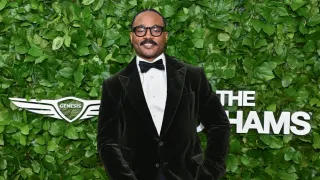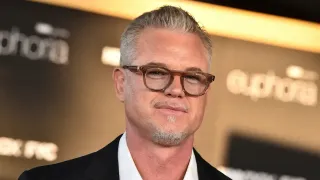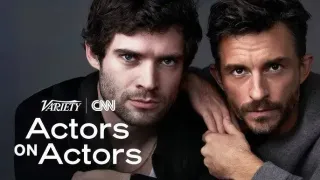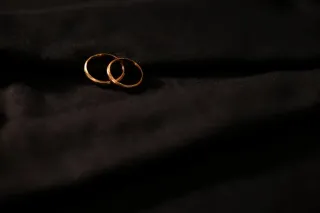June 5, 2024
Inside the Queer World of Netflix's 'Eric' with Abi Morgan & McKinley Belcher III
Frank J. Avella READ TIME: 11 MIN.
Don't be put off by the simplicity of the title of the new Netflix limited series, "Eric." Set in the 1980s this dense, original thriller is a fascinating character study, a meditation on race and homophobia, and a nail-biting thriller, all in one.
Created by playwright/screenwriter Abi Morgan ("The Iron Lady," "Shame," "Suffragette"), the narrative follows puppeteer Vincent (Benedict Cumberbatch), a demanding creator of a mega-popular TV children's show, who must deal with the disappearance of his 9-year-old son, Edgar (amazing newcomer Ivan Howe). Vincent has managed to alienate his wife, Cassie (Gaby Hoffmann), and most everyone else in his life as he becomes obsessed with finding his boy... in a most unusual way.
The lead detective on the case, closeted gay man Michael Ledroit (McKinley Belcher III), is also bent on finding the boy. Ledroit has a partner at home dying of AIDS and is dealing with racism and homophobia in his own department on a daily basis. In addition, there's a missing Black boy on the books, but little effort is being made to find him. Ledroit also seems to have a past relationship with the seedy Studio 54-esque owner who might be at the center of the crimes.
Born in Georgia, Belcher has appeared quite frequently on the NYC stage, most recently in the all-Black Broadway revival of "Death of a Salesman" opposite Wendell Pierce. The openly queer actor's TV credits include major roles in "Mercy Street," "Ozark," and "We Own This City." Onscreen he's appeared in "Mapplethorpe" and "Marriage Story."
Besides her acclaimed plays and screenplays, Morgan's British TV work includes "Sex Traffic," "The Hour" with Ben Whishaw, and "River," starring Stellan Skarsgård and Lesley Manville.
EDGE had the pleasure of zoom-chatting with both writer/creator Morgan and featured actor Belcher.
EDGE: Abi, I truly appreciate the original work. Where did the idea for "Eric" come from?
Abi Morgan: It came from a couple of things. When I was 18, I went to New York and spent a bit of time looking after a child... Out of the apartment window, just across the street, I could see an old theater. And through the theater window I could see there was some kind of studio... People were always lined up. It was a chat show. So, I was curious about New York, this amazing iconic city that had always been such a character in so many movies I'd loved... And then the second thing is, my father was a theater director, and I grew up in theaters, so I've always loved backstage and the process and how things are made. And creative geniuses that are toxic messes, as well. I think that was also the drive to create the character of Vincent. And I think it was the collision of these two experiences of looking after this child in New York, and my love of American movies and the New York that I'd seen in those movies, and then just wanting to go back into that time with this creation of Vincent. That's how the idea basically came together.
EDGE: Can you tell us about the development process and it coming to fruition? Did it take a long time?
Abi Morgan: I pitched the idea to Netflix on a line, really. I was like, look, it's about this crazy, mad puppeteer who goes on this quest to find his disappeared son with a seven-foot blue puppet. And they were like, "God, we love it..." I pitch a million ideas, and no one does anything with them. But it was just one of those ideas that really grabbed... It was a pretty quick, but very intensive, writing process... I got a very strong pitch document and the first episode, and then the show got fully greenlit. Then it was a real process of distilling all the research that we'd done... It was then a process of refining.
Unusually, we had six episodes when we started shooting. Sometimes there's always a bit of a kick-bullet-scramble to get that last episode written. So, it was great to have the full shape of the show when we started shooting. It's a real lesson for me now. I really never want to do that again. I always want to start with the whole show written, I never want to go to that place, because it's really good to know where your show is gonna fully end.
EDGE: This series is so dense with themes and subplots, and one of the most compelling is Michael Ledroit. What a storyline – a gay cop working in this racist, homophobic New York City Police Department in the '80s. Can you both comment on creating and embodying this character?
Abi Morgan: All I can say is that we watched McKinley on tape, and we were just like, it's Michael Ledroit. I think there's a stillness and an intensity and a huge compassion, and yet tenderness, to McKinley as an actor that did so much with the character of Ledroit, who is a product of a military father, and, as you say, watching this very brutalized, very racist NYPD. But McKinley took it from the page for me and made it into something other.
McKinley Belcher III: I'm blushing hearing you talking about work. [Laughs] I was really excited when I read this. It was really important to me to get to play a queer role on camera, in a story that was interested in who he is, and what's happening with his heart, and how that affects what he does throughout the story. There's so much about Ledroit's journey through the six episodes, that it's about stepping into his power and understanding that if he wants to be the change that he wants to see in the world, he has to accept himself, love himself, and live in that fully before he can do the things that he needs to do to find this child, but also start to remedy the sort of systemic problems that existed in the NYPD.






